Inside AFP
Death, exhaustion and suspicion: AFP journalists on the horrors of Gaza
Every day since October 7, AFP's team of journalists in Gaza have been risking their lives to cover a war that has shaken the world. They have all had to flee their homes, working without respite in the shadow of death in a territory they are not allowed to leave.
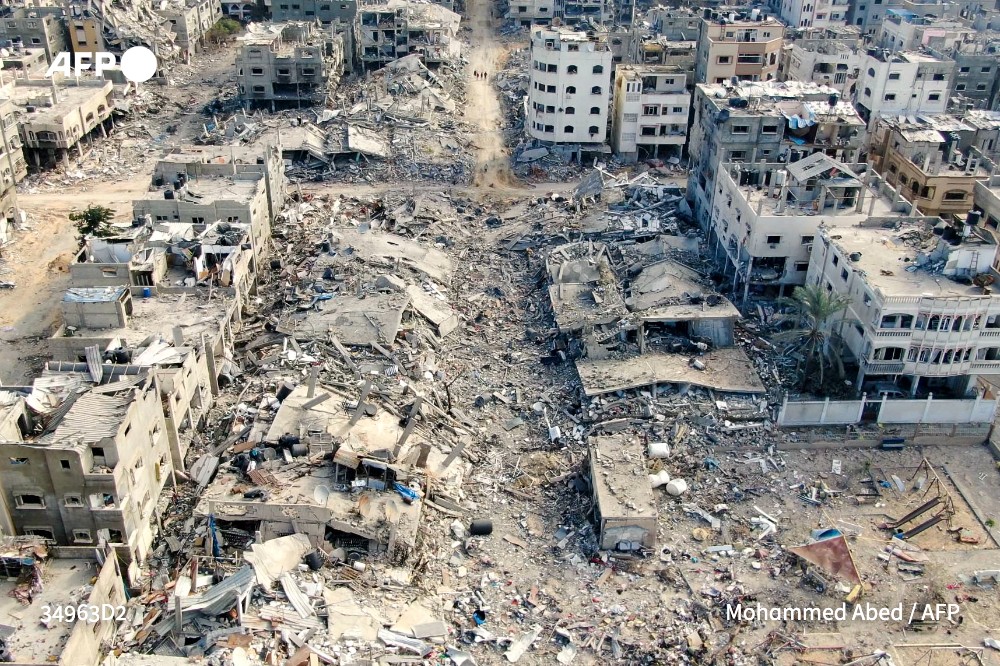
An aerial view on December 26, 2023 shows destroyed buildings in Beit Lahia following Israeli bombardments in the northern Gaza Strip. Mohammed Abed / AFP
Here our eight staff still in Gaza tell of the horrors they have witnessed, the threat of becoming targets themselves, and their determination to document this relentless conflict.
Most had covered half a dozen wars before October 7, and as Gazans had lived with the privations and travel restrictions of the blockade for 17 years. They were used to having to visit the morgues to count the dead and the endless funerals. But their lives changed forever when 1,160 people -- mostly civilians -- were killed in the unprecedented attack by Hamas militants on Israel, according to an AFP count based on official Israeli figures.
"I was outside around six in the morning when I heard explosions that seemed to be coming from everywhere," recalled Adel Zaanoun, who has been an AFP journalist in Gaza for 30 years. "We were trying to work out if they were Israeli bombardments or Hamas firing rockets.
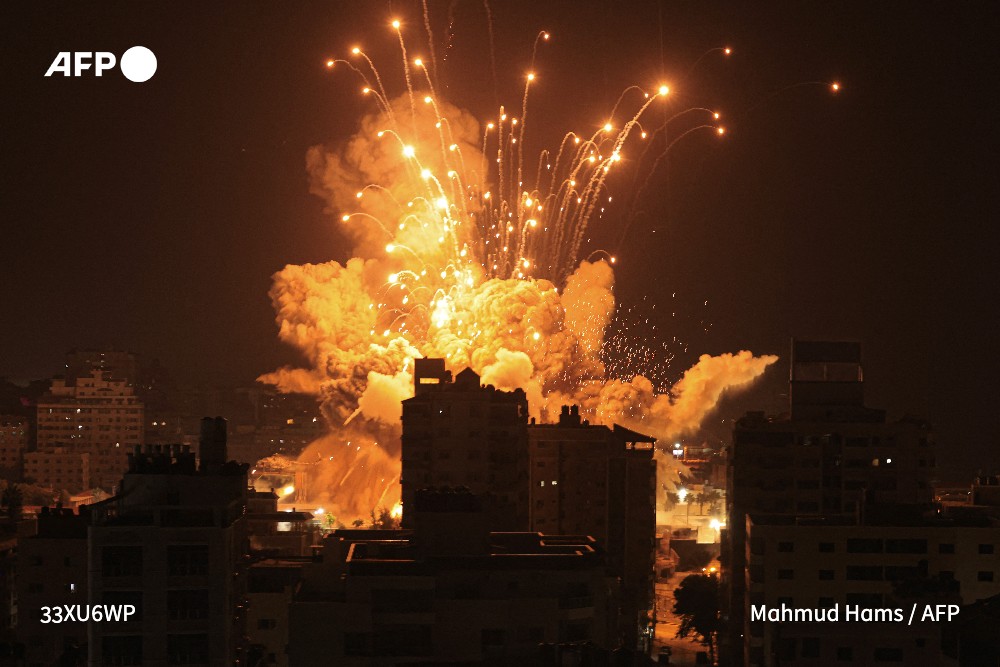
A missile explodes in Gaza City during an Israeli air strike on October 8, 2023. Mahmud Hams / AFP
"I called all my AFP colleagues to meet up in the office... On the road I rang all the spokesmen of Hamas and Islamic Jihad. They said they didn't know anything. Finally one of them said that the 'Qassam Brigades (Hamas' armed wing) were going to put out a statement'. A little later a communique from their chief Mohammed Deif announced that 'Operation Al-Aqsa Flood' had started."
More than four months on, the Gaza Strip has been devastated, with the humanitarian situation there catastrophic. Israel, which has vowed to wipe out Hamas, has been pummeling the territory, with the Palestinian death toll now at more than 27,800, according to the Hamas-run health ministry.
Nothing left but rubble
When humanly possible, AFP's reporters, photographers and video journalists rush to the scene of every new strike.
And every time, beyond the danger of a secondary strike that might kill them, they are faced with the pain, anguish and sometimes the anger of survivors. The horror of mutilated bodies, often of small children, has to be witnessed, described, photographed, filmed.
"If the internet is working, journalists exchange information on the location of the latest strikes on WhatsApp. If the network is down we try to follow the sound and once we are in the area people guide us," said Mohammed Abed, an AFP photographer in Gaza for 24 years.
But getting around is not easy. With nearly two million people displaced, most now sheltering in Rafah, "there are traffic jams everywhere", he said. "You have to weave your way through the waves of the displaced, through tents and stalls set up in the middle of the road. Whole districts have been razed with nothing left but rubble."
"One litre of petrol can cost $45," said Zaanoun. "So sometimes we would rather walk for an hour than take a car, because we don't know if we will get petrol tomorrow when there could be a more important journey to make."
The news and images gathered on the ground are sent to AFP's editors based in Nicosia in Cyprus, the agency's Middle East headquarters, where they are verified before being sent out to media across the world. None of which could have been done without the boundless inventiveness of technician Ahmed Eissa. Amid so much danger and destruction, he found solar panels to recharge cameras and computers and ingenious work-arounds for power and internet cuts.
Eissa is the only member of the AFP team to have been able to get out of Gaza, leaving late last month.
Watching 'Gaza disappear'
Determined as they are, there is no hiding the exhaustion.
"We have been working 24/7 for four months," said Zaanoun. "But we must because what we are watching is Gaza disappear in front of us. Its homes, its historic heritage is being destroyed, its people are dying; everything is going up in smoke under the Israeli strikes. Nowhere is safe... I have seen children going out under the bombs to rummage through bins in the hope of finding a bit of bread. Their lips were cracked, you could see they had not drunk any water in a long time..."
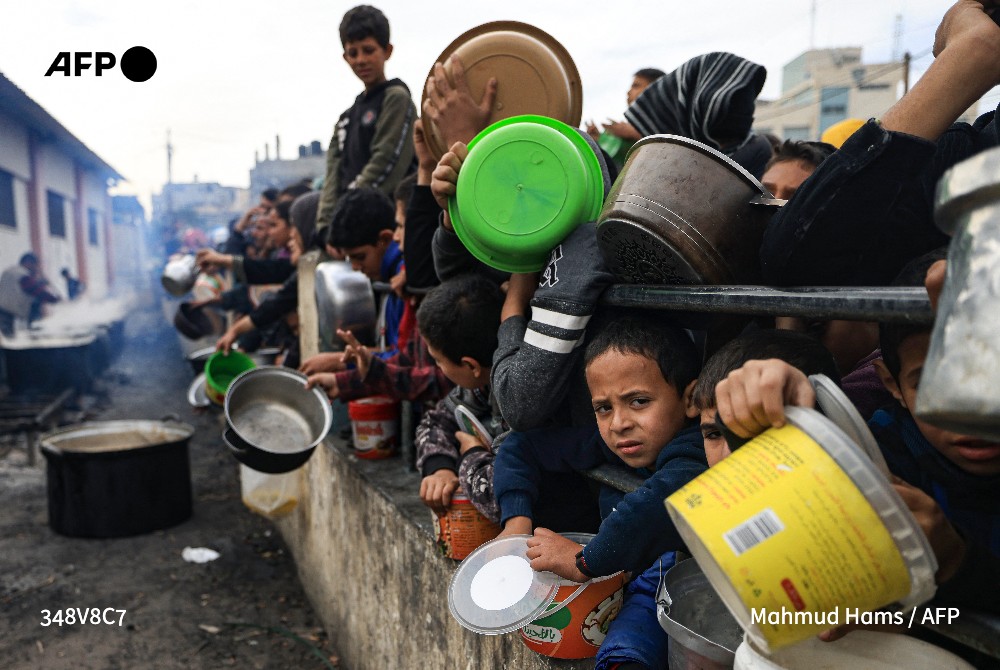
Palestinians children wait to collect food at a donation point in a refugee camp in Rafah in the southern Gaza Strip on December 23, 2023. Mahmud Hams / AFP
Mai Yaghi too has had to face down exhaustion and a sense of powerlessness. When some cast doubt on the Hamas health ministry toll of the number of Gazans killed, Yaghi -- an AFP reporter in Gaza for 16 years -- went around the hospitals herself to investigate. She got officials to show her the computer system where the victims are counted: in one column those killed in the war, in the other those from natural causes.
"Because of our work, we see more horrors than anyone else," she said.
"It is our duty to recount the suffering of people. But when you immerse yourself in it, you realise how enormous it is for us as well, and how powerless we are."
When the war started, the AFP team hoped it wouldn't last long and that life would go on despite all, as it had during past conflicts, said Zaanoun. But very quickly "the horror and the danger took over: the strikes from the air, the sea and the land intensified. We had never seen it like this before. The Israeli army targeted houses while the inhabitants were still inside. The number of killed and wounded hasn't stopped growing."
It became particularly difficult to work when Israeli forces ordered the entire population in the north of the Strip including Gaza City, where almost all AFP journalists lived, to move south. Not only had they to abandon their homes on October 13, but they had also to leave the AFP office, one of the rare international media bureaus in Gaza.
Three weeks later came another bitter blow when the office -- a second home for many -- was badly damaged in a strike. Shortly after, the camera on the bureau's balcony, which had been transmitting live images since the start of the war to the world's media, stopped working.
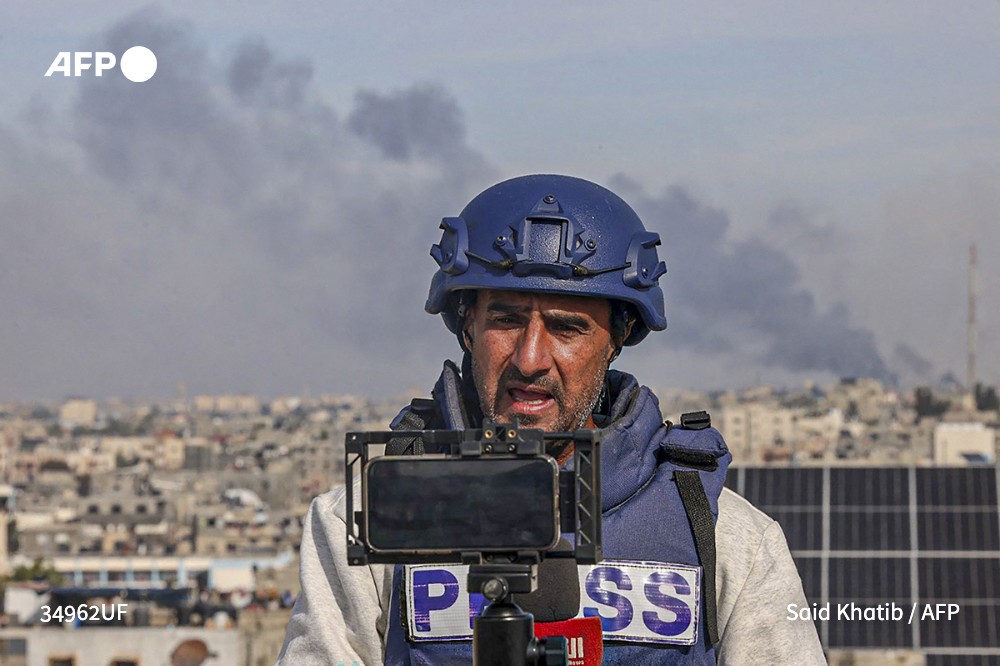
A Palestinian journalist uses the mobile phone to broadcast live in Rafah on the southern Gaza Strip on December 27, 2023. Said Khatib / AFP
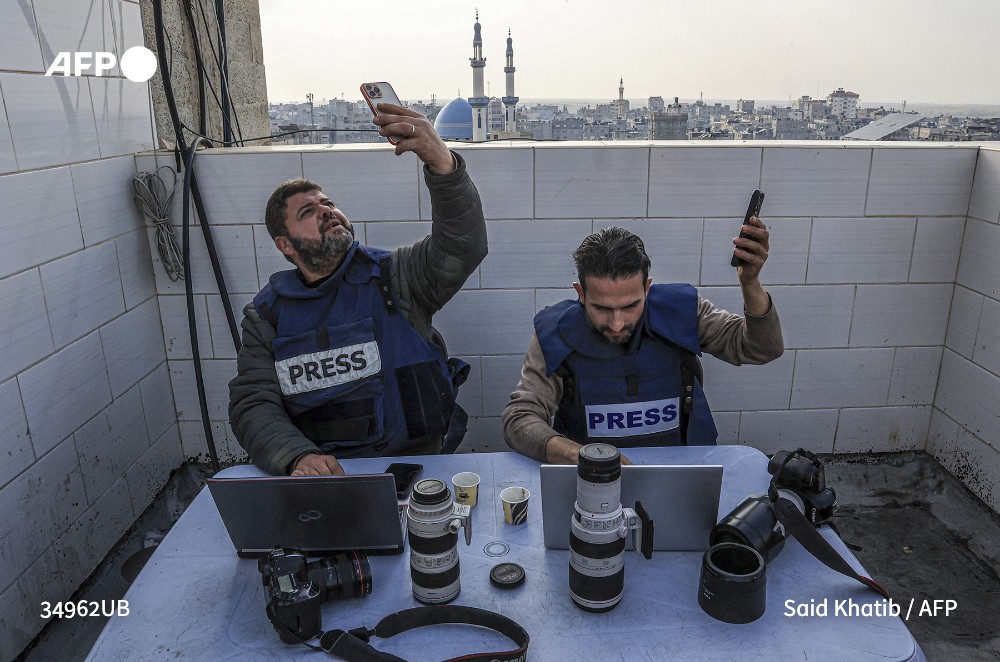
Palestinian journalists attempt to connect to the internet using their phones in Rafah on the southern Gaza Strip on December 27, 2023. Said Khatib / AFP
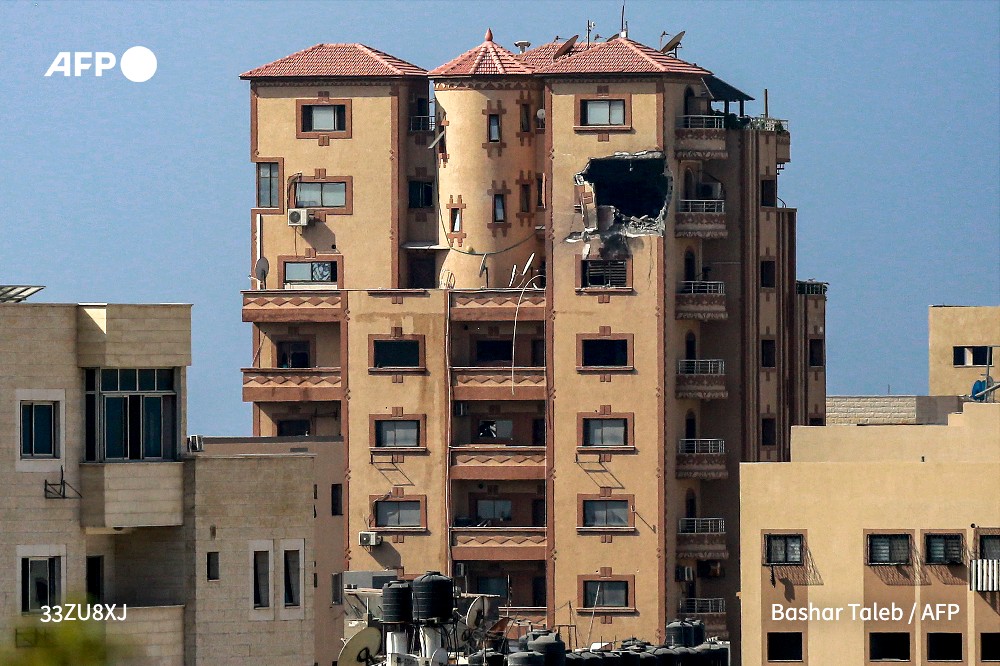
This picture taken on November 3, 2023 shows a gaping hole following a strike on the Hajji building, which houses several offices including those of Agence France-Presse (AFP) news bureau in Gaza City. Bashar Taleb / AFP
'Colleagues dying in front of you'
Since Israel placed the Gaza Strip under a "total siege" on October 9, AFP journalists in Gaza have been cut off. Unlike during some previous conflicts there, no colleagues from Jerusalem or other AFP bureaus across the world have been able to come to back them up. Even calling colleagues in Jerusalem, with whom they always work closely, has become difficult.
Not a single AFP journalist has been allowed to leave Gaza despite numerous appeals to the Israeli authorities, and they feel caught in a trap.
Their fears have not been helped by the number of Gazan journalists already killed in strikes. So far 85 journalists and media professionals have been confirmed dead, according to the Committee to Protect Journalists (CPJ) in their latest toll to February 7.
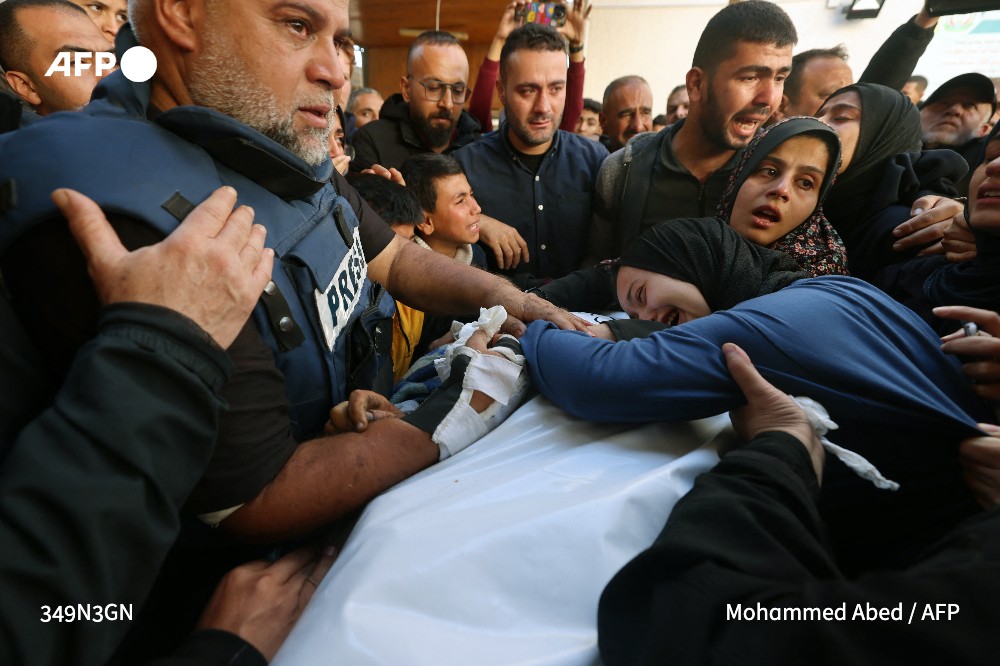
The widow (R) of Hamza Wael Dahdouh, a journalist with the Al Jazeera television network, and his father Al Jazeera's bureau chief in Gaza, Wael Al-Dahdouh (L) mourn over his body during his funeral, after he was killed in a reported Israeli air strike in Rafah in the Gaza Strip on January 7, 2024. Dahdouh, who was himself wounded in the arm, lost his wife and two other children in Israeli bombardment in the initial weeks of the war.
Mohammed Abed / AFP
"One day, there was a strike that claimed the lives of several colleagues, not far from me," said Zaanoun. "Imagine your friends, your colleagues, dying in front of you. Imagine being woken up by the noise of an enormous bombardment, seeing human remains flying in every direction, the tent over your head collapsing and a ton of dust and sand falling on you.
"We all know that, at any moment, it could be one of us," he added. "Our families know it too. They are panicking. When the telephone works, our wives and our children call us all the time to ask where we are, and what we are doing. They tell us not to be away from them for too long, to be careful. Because they know that wherever we go we are heading to the heart of death and they hope we will survive."
Since the Israeli army told AFP they cannot "guarantee the security" of the agency’s journalists in Gaza, all feel under threat.
"Wearing a flak jacket with 'PRESS' on it doesn't protect you," said photographer Abed. "We risk being killed at any moment."
Yahya Hassouna, an AFP video journalist in Gaza since 2009, remembers one strike in October in Gaza City. "Residents of a building had been warned that it would be bombed. We set ourselves up with other video journalists under the porch on the building opposite. A few minutes later, it was our building that was targeted. Three of my colleagues were killed."
'We remain professional'
The fear of being targeted is all the stronger because journalists have been accused of sometimes being complicit with Hamas. Some have gone so far as to claim reporters were tipped off in advance of the October 7 attack, allegations AFP management has rejected as disgraceful and defamatory.
AFP journalists in Gaza find the claims all the more outrageous given how they have worked closely with Israeli colleagues in the Jerusalem bureau for years.
Abed said some people "have accused us of being partial. But we remain professional. We remain journalists, even as our neighbours, our friends and our families are being bombed."
Since October 7, the group Reporters Without Borders has made two war crimes complaints against the Israeli army over the deaths of Palestinian journalists. And the CPJ -- in a report published before the deaths of two Al Jazeera journalists in an Israeli strike on January 7 -- deplored "an apparent pattern of targeting of journalists and their families by the Israeli military".
Last week five independent experts working for the United Nations in Geneva denounced the "attacks" on the media in Gaza, saying that it "would seem to indicate that the killings, injury and detention are a deliberate strategy by Israeli forces to obstruct the media and silence critical reporting".
In a telling example of how this translates on the ground, most property owners in Gaza refuse to rent apartments to journalists. To put a roof over their families' heads, journalists are having to sometimes pay five times the going rent.
Covering both sides
Allegations of journalists being Hamas sympathisers seem to come from the simple fact that Gazan reporters are in regular contact with Hamas officials, as they are supposed to be in order to do their jobs correctly.
Contact is inevitable, said Zaanoun. Every day the Israeli government and Hamas -- which has controlled the Gaza Strip since 2007 -- announce new operations and the latest death tolls and threaten each other. AFP has to systematically ask for reactions from both camps to produce balanced and impartial news.
"There are not many journalists in Gaza and not that many (political) leaders either. So it is a small world and we end up getting to know each other," said Zaanoun, who began his career in Gaza when the territory was controlled by Yasser Arafat's Fatah movement.
However, there is no direct contact with Hamas's armed wing. "They communicate only by statement," he said.
The same rules apply in Gaza as elsewhere for AFP journalists. They must be in contact with the authorities in the areas they cover while at the same time keeping the required distance for the independent and impartial journalism enshrined in the statutes of the agency.
'We have run out of tears'
Like for all Gazans, the living conditions of AFP staff have become increasingly difficult. After having to leave their homes in October, some have spent weeks sleeping in cars or in tents outside the Nasser hospital in Khan Yunis. Now all AFP's journalists and their families are in Rafah. When not working, they spend hours looking for food and drinking water, or washing the dust by hand from the few clothes they have been able to take with them.
"I am never safe, I don't sleep anymore, I don't eat enough, I can't wash when I want to," said Mai Yaghi. "You have to content yourself with one ice-cold shower a week, even though it is so cold outside. Even just to go to the toilet, you have to organise yourself.
"My biggest dream is to have an hour to myself, where I don't hear anyone, no bombardments, no drones. Just an hour with a cigarette and a coffee."
Yaghi said she has "lost neighbours, friends, loved ones, but right now I don't feel any emotion. I have the sense that my sadness is frozen. I can't let myself succumb to that sadness, because then I would collapse completely, and I can't.
"I have responsibilities, I have to stay strong," she said. "I have to keep up appearances and make out that everything is OK to reassure those locked up in Gaza with us, or those who love us on the outside."
"We have literally run out of tears," said photographer Abed. "I work like a robot now. I go out, I press the button and I see nothing after so much shock, tears and grief... And when I sit or lie down on a mattress, the film of the day plays in front of my eyes. We are all on edge because on top of all this we don't have much to eat and we drink bad water."
"All the journalists have PTSD (Post-Traumatic Stress Disorder)," said Hassouna. "In Gaza, if someone tells you they are OK, you can be sure they are lying. Everything that we have seen, that we have filmed, will stay with us forever. We will never forget."
Being separated from their loved ones is particularly difficult.
Zaanoun can't stop thinking about his mother and his brothers who were not able to leave Gaza City. For Yaghi it's her children. Her daughter left Gaza to go and study in Britain just before the war. Then after weeks of fighting, "the hardest thing" was to let her 11-year-old son Jad leave on his own.
On the road to the Egyptian border with him, "I only thought of one thing: he has to get out and we will be reunited later.
"I repeated to him: 'You are strong, you will be safe with the diplomats who will evacuate you, and your father and your aunt are waiting for you in Cairo.'
"At first, he refused to leave without me. I kept telling him that I would be fine. But he didn't believe me. He hugged me tight like it was the last time. He made me swear that I would be OK and that we would be together again. That was two months ago. And now, I only want one thing: to hold my children in my arms again."
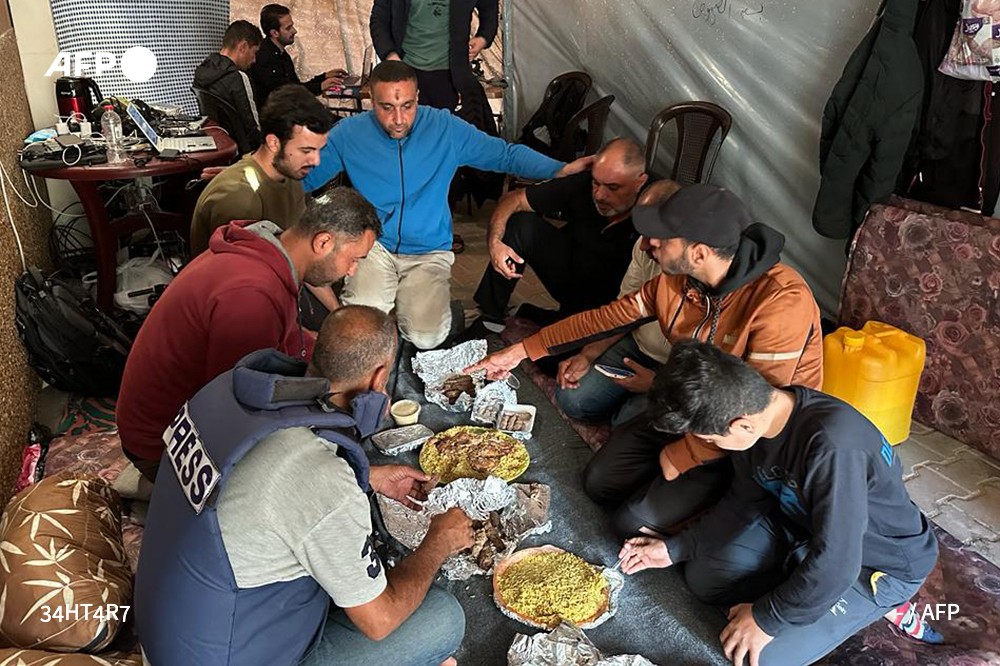
AFP journalists and family members share a meal on December 10, 2023 in Rafah in the southern Gaza Strip. AFP
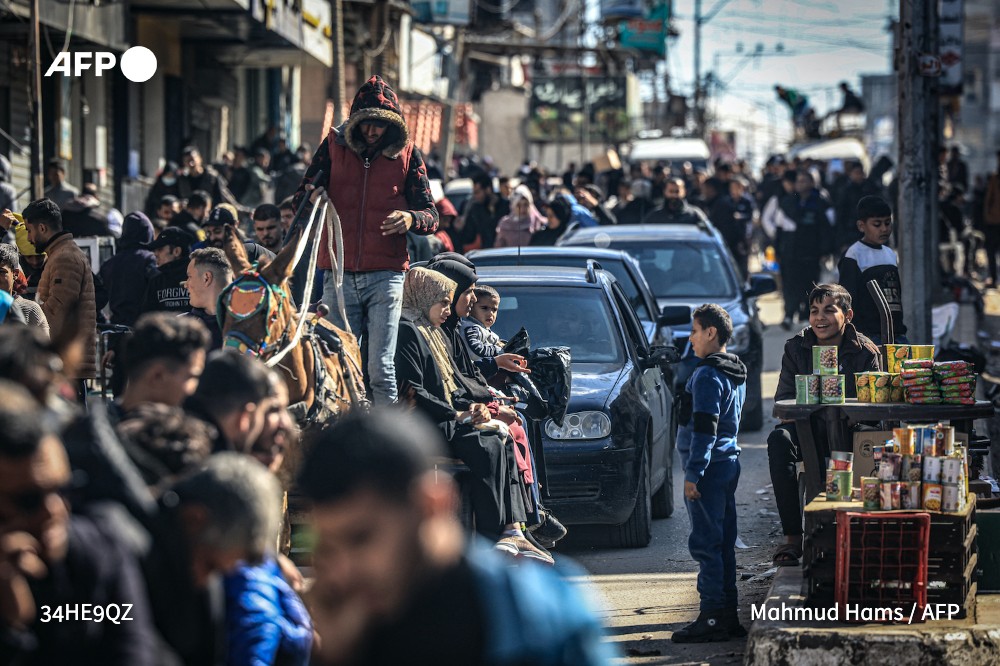
People who fled fighting in the Gaza Strip gather along an overcrowded street in Rafah in the southern part of the Palestinian territory on February 1, 2024. Mahmud Hams / AFP
Interviews conducted by Sarah Benhaida from Jerusalem. Edited by Catherine Triomphe and Fiachra Gibbons in Paris and Daniel Capurro in Nicosia